 Behind EXCEL Campus Activities' Fright Night screamsWith the lights out and sheets of black cloth covering the Rio Grande Ballroom, there is a sense of eeriness around every corner of the constructed maze of horror: little dolls on the ground, animatronics of horror movie icons and actors whose jobs are to scream and shout. A line extends into the hallway of the second story of the University Center. Students and their families wait to catch a glimpse of the horror that awaits beyond closed doors — for something wicked this way comes. But before the ghastly sights and sounds can be seen and heard, they have to be built up. Every year, EXCEL Campus Activities hosts Fright Night, an event where the organization builds a haunted house for students and their families and friends to enjoy on Friends and Family Weekend. This year’s theme for the haunted house was “Haunted Mansion.” Planning for Fright Night starts as far back as the spring semester, when the previous year’s director team begins suggesting ideas. Haylee Jenkins, graduate assistant for Student Activities, said once the new student directors come in for the upcoming school year, they are tasked with setting up dates for workshops. Jenkins has been a part of several EXCEL Campus Activities haunted houses, and has run a Fright Night, acted in one and now serves as an adviser to the current programming director, Elizabeth Gonzales. She said her roles at Fright Night have been very different throughout the years. Being an actor, the only job is to be scary and to have fun doing it. When it comes to running the show, however, it becomes a more detail-oriented task. “We’re turning a blank room into a full house depending on the theme,” Jenkins said. “One year I did a clown themed one, so we had to think of, ‘How do I make this place look like a circus when it’s just a random ballroom upstairs of the UC?’” The theme this year, however, was more aimed at going back to the classics. “We’ve had some pretty extreme themes for the past couple years, like ‘house of cannibals,’” she said. “We’ve had a mad lab of science, and then we’ve also had some other themes, like ‘circus.’ So this really goes back to the classic, and it’s kind of the Disney twist of the ‘Haunted Mansion.’” Gonzales said the beginning months all came down to planning: What are the actors going to need, what are the actors going to be doing while the haunted house is going, what kind of room layouts will be featured? As the event got closer, it became about making props and training up the actors. Around 20 actors perform for the haunted house, all of which are EXCEL Student Activities members. “We don’t have any kind of requirements for experience, but I just really go for the people who I think are passionate about it and who have excitement with wanting to scare people,” Gonzales said. “It’s a fun thing.” Days before the haunted house started, actors began trying on their costumes and watching videos to sharpen their scaring techniques. Computer science junior Daniel Fielder is a member of EXCEL Student Activities who helped build props and acted in this year’s edition of Fright Night. In the show, he was one of the first actors that attendees interacted with. “As the butler, you’re kind of the guide for people,” Fielder said. “So you’re just trying to guide people from one place to another, but also trying to keep them a little on edge.” The props that were used this year were mostly new, with a few things recycled into the program, such as the animatronic of Leatherface from “The Texas Chain Saw Massacre.” The hand-built props ranged from painted cardboard all the way to an 8-foot fridge or 10-foot grandfather clock. Jenkins said two out of the 11 workshops were dedicated to constructing the clock. On the day before and the day of the Fright Night haunted house, it was time to move the props upstairs. Volunteers with carts went to and from the EXCEL Student Activities cubicles in the University Center basement up to the Rio Grande Ballroom as actors put on their costumes and makeup to begin rehearsals. “It’s just a very long process that might seem stressful at the beginning, but once you get to like group number 40 during the event, it just all feels so worth it because you hear the screams, you hear the laughter and you’re actually truly making somebody’s day,” Jenkins said. When the clock struck 7 p.m. on Saturday, it was showtime. All the actors were merely players, and the Rio Grande Ballroom was their spooky stage. @wall035203 news-editor.shorthorn@uta.edu
Behind EXCEL Campus Activities' Fright Night screamsWith the lights out and sheets of black cloth covering the Rio Grande Ballroom, there is a sense of eeriness around every corner of the constructed maze of horror: little dolls on the ground, animatronics of horror movie icons and actors whose jobs are to scream and shout. A line extends into the hallway of the second story of the University Center. Students and their families wait to catch a glimpse of the horror that awaits beyond closed doors — for something wicked this way comes. But before the ghastly sights and sounds can be seen and heard, they have to be built up. Every year, EXCEL Campus Activities hosts Fright Night, an event where the organization builds a haunted house for students and their families and friends to enjoy on Friends and Family Weekend. This year’s theme for the haunted house was “Haunted Mansion.” Planning for Fright Night starts as far back as the spring semester, when the previous year’s director team begins suggesting ideas. Haylee Jenkins, graduate assistant for Student Activities, said once the new student directors come in for the upcoming school year, they are tasked with setting up dates for workshops. Jenkins has been a part of several EXCEL Campus Activities haunted houses, and has run a Fright Night, acted in one and now serves as an adviser to the current programming director, Elizabeth Gonzales. She said her roles at Fright Night have been very different throughout the years. Being an actor, the only job is to be scary and to have fun doing it. When it comes to running the show, however, it becomes a more detail-oriented task. “We’re turning a blank room into a full house depending on the theme,” Jenkins said. “One year I did a clown themed one, so we had to think of, ‘How do I make this place look like a circus when it’s just a random ballroom upstairs of the UC?’” The theme this year, however, was more aimed at going back to the classics. “We’ve had some pretty extreme themes for the past couple years, like ‘house of cannibals,’” she said. “We’ve had a mad lab of science, and then we’ve also had some other themes, like ‘circus.’ So this really goes back to the classic, and it’s kind of the Disney twist of the ‘Haunted Mansion.’” Gonzales said the beginning months all came down to planning: What are the actors going to need, what are the actors going to be doing while the haunted house is going, what kind of room layouts will be featured? As the event got closer, it became about making props and training up the actors. Around 20 actors perform for the haunted house, all of which are EXCEL Student Activities members. “We don’t have any kind of requirements for experience, but I just really go for the people who I think are passionate about it and who have excitement with wanting to scare people,” Gonzales said. “It’s a fun thing.” Days before the haunted house started, actors began trying on their costumes and watching videos to sharpen their scaring techniques. Computer science junior Daniel Fielder is a member of EXCEL Student Activities who helped build props and acted in this year’s edition of Fright Night. In the show, he was one of the first actors that attendees interacted with. “As the butler, you’re kind of the guide for people,” Fielder said. “So you’re just trying to guide people from one place to another, but also trying to keep them a little on edge.” The props that were used this year were mostly new, with a few things recycled into the program, such as the animatronic of Leatherface from “The Texas Chain Saw Massacre.” The hand-built props ranged from painted cardboard all the way to an 8-foot fridge or 10-foot grandfather clock. Jenkins said two out of the 11 workshops were dedicated to constructing the clock. On the day before and the day of the Fright Night haunted house, it was time to move the props upstairs. Volunteers with carts went to and from the EXCEL Student Activities cubicles in the University Center basement up to the Rio Grande Ballroom as actors put on their costumes and makeup to begin rehearsals. “It’s just a very long process that might seem stressful at the beginning, but once you get to like group number 40 during the event, it just all feels so worth it because you hear the screams, you hear the laughter and you’re actually truly making somebody’s day,” Jenkins said. When the clock struck 7 p.m. on Saturday, it was showtime. All the actors were merely players, and the Rio Grande Ballroom was their spooky stage. @wall035203 news-editor.shorthorn@uta.edu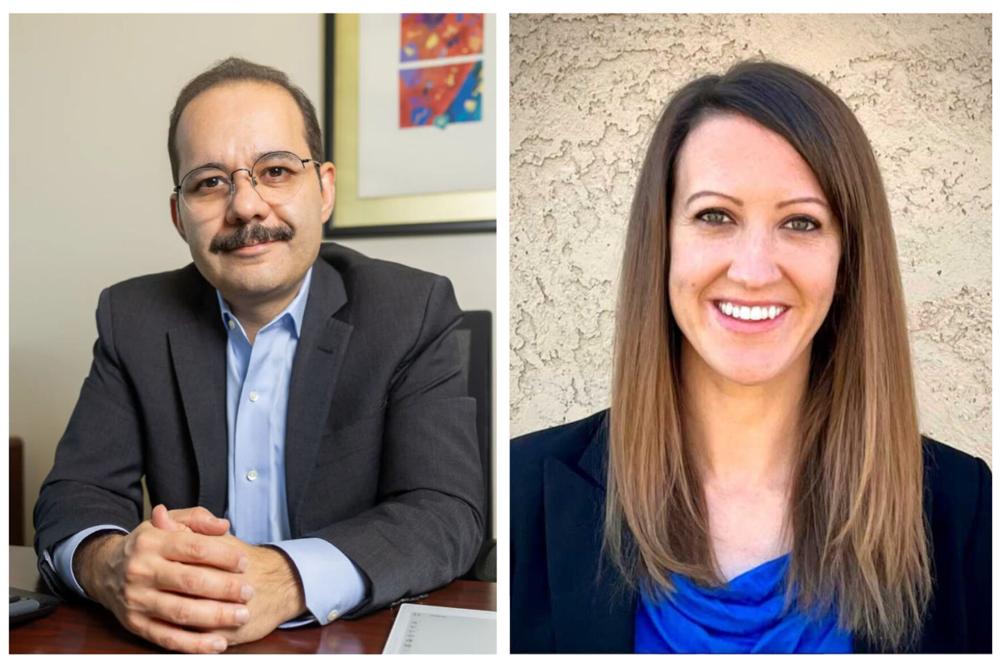 UTA faculty receive 2025 Regents’ Outstanding Teaching AwardsCivil engineering professor Mohsen Shahandashti and social work associate professor Karen Magruder have received the 2025 Regents’ Outstanding Teaching Award. Since 2008, the Regents’ Outstanding Teaching Awards have been a way to recognize UT System educators who have demonstrated a commitment to teaching excellence through effectiveness, innovation and creativity according to the UT System website. The awards are a symbol of the importance placed on the provision of teaching and are used as an incentive for others to work on enhancing student learning. Up to 15 awards are given every year. Nominations begin in February and end in May, and the recipients are announced in September, with their awards presented during the November Board of Regents meeting. Professors who receive the award are given $25,000, a certificate and a medallion. Karen Magruder For Magruder, teaching social work is about more than just classwork or grades. The associate professor of practice said she focuses on making online learning more humanized, even when she and her students aren’t in the same room. She said she tries to make the courses interactive, organized and easy for students to connect with. “I really try to be student-centered,” Magruder said. “Humanizing online education has really been something that I’ve leaned into.” Her teaching style combines knowledge and empathy, she said. To Magruder, a good professor isn’t just someone who knows their subject but someone who’s approachable and makes students feel cared for. “A lot of times, it’s more about the passion, or the authenticity, or the enthusiasm, the availability,” she said. Magruder’s story at UTA started years before she began teaching. She earned her master’s degree in social work from the university, then came back as an adjunct instructor before joining the faculty full time. While teaching, she finished her Doctor of Social Work degree earlier this year at the University of Kentucky, and leads the School of Social Work’s new doctoral program. Magruder didn’t always plan on becoming a professor, but she said it was on her radar after she took a career aptitude test in high school. “It was kind of tied for top three, and it said the three roles I was best suited for would be being a counselor, a manager or a teacher,” she said. “And now I’m all three.” Magruder said she wants students to see how what they learn connects to real people and communities. “I just know that they’re going to make a huge impact in their work,” she said. “It’s really rewarding and fulfilling to me.” Magruder said winning the Regents’ Outstanding Teaching Award was both exciting and humbling. She said she feels thankful for the people who helped get her to this point. “I’m just incredibly grateful to receive that recognition and acknowledgment of all of the efforts and hard work and everything,” she said. Mohsen Shahandashti Nothing is a stupid question to Shahandashti, civil engineering professor and associate dean of administration in the College of Engineering. He has worked at UTA for 11 years and said that there is a reason he is here: to help his students learn. Shahandashti said he always knew he was going to become a teacher. As an undergraduate student, he was a teaching assistant, sometimes not getting paid for his work. He said he knew he wanted to build things and work with math and physics. After talking with several professors in different areas, he said, he decided on civil engineering. Since he was a PhD student, Shahandashti has looked for opportunities to mentor and teach undergraduate students. “My passion has been in teaching forever,” Shahandashti said. “It feels very good when you are recognized for something that your heart is in.” The most important part of teaching is the students, he said. Despite all his research, labs and patents, he said the best thing has been watching his students grow and become successful outside of the university. “It seems that a piece of me will live forever with them and their lives,” he said. Earlier this year, the Office of the Provost reached out and told him he was nominated, he said. After his nomination, he filled out forms detailing his accomplishments at UTA, which included the courses and curricula he had created. Shahandashti said the award means a lot to him. Teaching is a pillar of a university, he said, and it should be taken seriously. “I hope this award shows others that they can do it, and I hope that it motivates them to be better teachers,” he said. “This award is important not because of just me, because it is signifying the importance of a profession.” @atclements03 @taylormakynzee news-editor.shorthorn@uta.edu
UTA faculty receive 2025 Regents’ Outstanding Teaching AwardsCivil engineering professor Mohsen Shahandashti and social work associate professor Karen Magruder have received the 2025 Regents’ Outstanding Teaching Award. Since 2008, the Regents’ Outstanding Teaching Awards have been a way to recognize UT System educators who have demonstrated a commitment to teaching excellence through effectiveness, innovation and creativity according to the UT System website. The awards are a symbol of the importance placed on the provision of teaching and are used as an incentive for others to work on enhancing student learning. Up to 15 awards are given every year. Nominations begin in February and end in May, and the recipients are announced in September, with their awards presented during the November Board of Regents meeting. Professors who receive the award are given $25,000, a certificate and a medallion. Karen Magruder For Magruder, teaching social work is about more than just classwork or grades. The associate professor of practice said she focuses on making online learning more humanized, even when she and her students aren’t in the same room. She said she tries to make the courses interactive, organized and easy for students to connect with. “I really try to be student-centered,” Magruder said. “Humanizing online education has really been something that I’ve leaned into.” Her teaching style combines knowledge and empathy, she said. To Magruder, a good professor isn’t just someone who knows their subject but someone who’s approachable and makes students feel cared for. “A lot of times, it’s more about the passion, or the authenticity, or the enthusiasm, the availability,” she said. Magruder’s story at UTA started years before she began teaching. She earned her master’s degree in social work from the university, then came back as an adjunct instructor before joining the faculty full time. While teaching, she finished her Doctor of Social Work degree earlier this year at the University of Kentucky, and leads the School of Social Work’s new doctoral program. Magruder didn’t always plan on becoming a professor, but she said it was on her radar after she took a career aptitude test in high school. “It was kind of tied for top three, and it said the three roles I was best suited for would be being a counselor, a manager or a teacher,” she said. “And now I’m all three.” Magruder said she wants students to see how what they learn connects to real people and communities. “I just know that they’re going to make a huge impact in their work,” she said. “It’s really rewarding and fulfilling to me.” Magruder said winning the Regents’ Outstanding Teaching Award was both exciting and humbling. She said she feels thankful for the people who helped get her to this point. “I’m just incredibly grateful to receive that recognition and acknowledgment of all of the efforts and hard work and everything,” she said. Mohsen Shahandashti Nothing is a stupid question to Shahandashti, civil engineering professor and associate dean of administration in the College of Engineering. He has worked at UTA for 11 years and said that there is a reason he is here: to help his students learn. Shahandashti said he always knew he was going to become a teacher. As an undergraduate student, he was a teaching assistant, sometimes not getting paid for his work. He said he knew he wanted to build things and work with math and physics. After talking with several professors in different areas, he said, he decided on civil engineering. Since he was a PhD student, Shahandashti has looked for opportunities to mentor and teach undergraduate students. “My passion has been in teaching forever,” Shahandashti said. “It feels very good when you are recognized for something that your heart is in.” The most important part of teaching is the students, he said. Despite all his research, labs and patents, he said the best thing has been watching his students grow and become successful outside of the university. “It seems that a piece of me will live forever with them and their lives,” he said. Earlier this year, the Office of the Provost reached out and told him he was nominated, he said. After his nomination, he filled out forms detailing his accomplishments at UTA, which included the courses and curricula he had created. Shahandashti said the award means a lot to him. Teaching is a pillar of a university, he said, and it should be taken seriously. “I hope this award shows others that they can do it, and I hope that it motivates them to be better teachers,” he said. “This award is important not because of just me, because it is signifying the importance of a profession.” @atclements03 @taylormakynzee news-editor.shorthorn@uta.edu
- Possession of controlled substance and theft of property reported in this week's crime logThis is a crime wrap-up from Oct. 17 to 20. Unauthorized use of a vehicle and unlawful carrying of a weapon On Oct 17, officers investigated a reported stolen vehicle, UTA Police Capt. Mike McCord said in an email. The unaffiliated driver was arrested for unauthorized use of a motor vehicle and unlawful carrying of a weapon. He was transported to the Arlington Police Department jail. Unauthorized use of a vehicle is a state jail felony, punishable by imprisonment of 180 days to two years in jail. Perpetrators may also receive a fine not exceeding $10,000. Unlawful carrying of a weapon in a prohibited place is a class A misdemeanor, punishable by a fine not exceeding $4,000, up to one year in jail or both. Driving while intoxicated On Oct. 18, an officer investigated a vehicle running and the driver appeared to be asleep, McCord said. The driver, a UTA student, was arrested for driving while intoxicated. Driving while intoxicated is a class B misdemeanor, punishable by a minimum of 72 hours in confinement. If the trial shows that there was an immediate open alcohol container in the offender’s possession when operating the vehicle, the minimum jail time becomes six days. Theft of property On Oct. 18, an unaffiliated person reported the theft of their phone while it was left unattended in a public restroom, McCord said. Theft of property valued between $750 and $2,500 is a class A misdemeanor, punishable by a fine not to exceed $4,000, up to one year in jail or both. On Oct. 20, a student reported being the victim of a scam, McCord said. Theft of property valued between $100 and $750 is a class B misdemeanor, punishable by a fine not to exceed $2,000, confinement in jail for up to 180 days or both. Both cases are still active. Possession of controlled substance in penalty group 1/1-B, fraudulent use of possession of credit card or debit card information and fraudulent use or possession of identifying information items On Oct. 20, officers made contact with two suspicious persons believed to be involved in bicycle/scooter thefts, McCord said. The unaffiliated persons were arrested for multiple outstanding warrants. Both individuals were found to be in possession of fentanyl and personal identifying information from other persons. They were both transported to the Arlington Police Department jail without incident. Possession of controlled substance in penalty group 1/1-B less than a gram is a state jail felony, punishable by imprisonment of 180 days to two years in jail. Perpetrators may also receive a fine not exceeding $10,000. Fraudulent use of possession of credit card or debit card information under five items is a state jail felony, punishable by imprisonment of 180 days to two years in jail. Perpetrators may also receive a fine not exceeding $10,000. Fraudulent use or possession of identifying information under five items is a state jail felony, punishable by imprisonment of 180 days to two years in jail. Perpetrators may also receive a fine not exceeding $10,000. @wall035203 news-editor.shorthorn@uta.edu

- Downtown Arlington Management Corp. shares visions for downtown and UTAThe Downtown Arlington Management Corp. hosted its annual meeting Wednesday at the Bluebonnet Ballroom at the University Center. Several speakers provided updates and visions for downtown and updates on the future of UTA’s campus. Maggie Campbell, Downtown Arlington Management Corp. president and CEO, and Garret Martin, Downtown Arlington Management Corp. vice president, gave updates about the downtown area, going over what the management corporation has done in the past few years. They’ve seen the growth of programs such as First Thursdays, achieving 51,000 visitors in the first full year of the program, and the Downtown Arlington Farmers Market, which saw 20,000 visits since its launch in March and over 1 million social media impressions. The downtown dog park, Doggie Depot, and the Rotary Dream Park also saw their grand openings. Martin said none of the new programs or improvements could have been done without the renewal of the Business Improvement District. The Arlington Ambassadors program was launched around two years ago. The ambassadors serve as the “eyes and ears” of the downtown community and help keep the district clean and safe, according to the Downtown Arlington Management Corp. website. They have cleaned around 36,588 pounds of trash from the city. Doug Kozma, vice president and campus planning strategist at SmithGroup, gave updates on the UTA master plan and what the campus might look like in the future. “As we engage into the future we expect to have more faculty, more students, more staff and more research making an impact on our campus in our community," Kozma said. He said UTA is projecting an accommodation of up to 10,000 additional students on campus, which will increase the need to grow. “UTA is, I would say, like an adult campus trying to fit into adolescent clothing,” Kozma said. He said the teams designing and planning out the details are talking about adding several thousand beds, expanding the University Center and augmenting the recreation and athletic assets. “This is going to make the students’ lives a lot better and UTA a better place,” Kozma said. There are also plans to build a hotel conference center on Cooper Street that would be connected to the hospitality program and new mixed-use parking structures. The research going into the master plan includes five campus community open houses, 41 focus group sessions and 15 on-campus pop-up sessions to collect data. “Walking here this morning, this afternoon, reminds me of how powerful and great it is to be at a great urban environment and on a great American campus,” Kozma said. City Manager Trey Yelverton talked about future updates for the city, and talked about the new Caravan Hotel, the space around the city tower and spaces that could see development, such as the Chase building, City Hall west parking lot and the UTA social work block. “I can tell you with 100% confidence the demand for downtown real estate, the project has never been higher,” he said. “It is red hot. There’s a lot of opportunities.” Yelverton said there are areas like the parking lot around the city tower that could see future development. The Chase building went on sale and he said that it doesn’t take much for someone to imagine what could happen with that land. “I’m proud to be able to reflect back on what’s been achieved and equally challenged by trying to do more of that in the future,” Yelverton said. @wall035203 news-editor.shorthorn@uta.edu
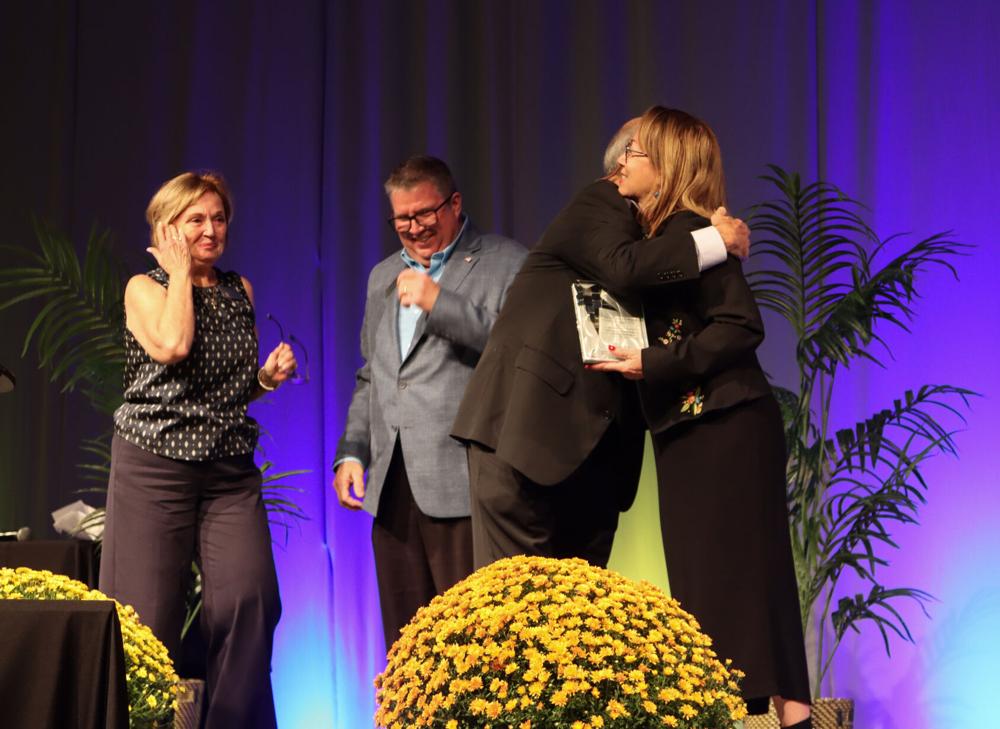
- UTA Volunteers hosts Fall into Service Volunteer FairUTA Volunteers hosted its Fall into Service Volunteer Fair from 1 to 4 p.m. Tuesday in the University Center’s Palo Duro Lounge, giving students a chance to get involved. Students walked around tables where they learned about various off-campus volunteering opportunities, including Arlington Public Libraries, the Taste Project and others. “Volunteering is one of those things that people find enjoyment with — helping the community, helping those in need,” said Loren Mediana, UTA Volunteers marketing committee member. “I hope students use the opportunities they find within volunteer fair to get involved and help those around you.” During the event, attendees had the chance to win a UTA Volunteers tote bag after visiting tables on a checklist they received upon entering. Matilde Franco-Gil said she came to the fair because she wanted to be more involved on campus. “I’m just trying to find volunteering events for a cause that I’m passionate about,’’ Franco-Gil said. Other students, like freshman Jaden Hidalgo, attended the volunteer fair in hopes of finding opportunities for their student organizations. From face painting to making candy bags and hygiene kits for donations, students were able to both participate in and learn about community service at the fair. “I hope what people get out of volunteer fair is to be more involved with the community outside of UTA,” Mediana said. @ayesha.haroonn news-editor.shorthorn@uta.edu

- Students show support for breast cancer patients with Steps of Hope walkStudents walked an approximately 30-minute lap around campus in Phi Alpha Honor Society pink shirts for the School of Social Work’s first Steps of Hope event Tuesday. The student-led event was held to show support for survivors of breast cancer, those who are being treated and those who have passed from it, said Natasha Sutherland, president of the honor society and social work master’s student. “I know many times people who may be suffering, they don't have the support,” Sutherland said. “But just being able to come together to show that, okay, support is there if you reach out.” October is Breast Cancer Awareness Month, and according to the National Breast Cancer Foundation, 1 in 8 women in the United States will develop breast cancer in their lifetime. Sutherland said she had a friend who passed away due to breast cancer and had a scare herself earlier this year. She said she also knows several people who’ve had mastectomies and are living healthy lives. “We actually took steps with the hope that persons are more aware of breast cancer and the impact it has on our lives,” she said. “Just join with others as we walk, as we continue to fight this illness.” Participants relaxed while walking around the perimeter of campus. Jahla Stephens, social work master’s student, said she came to the event because she likes to advocate for populations that don’t get as much attention. “I like to support people, help people, in any way that I can,” she said. Stephens said she enjoyed the cool weather during the walk and how non-social work majors also showed up to support. “It's important for people to collab that's not just in social work, but everyone,” she said. The Phi Alpha Honor Society hopes to increase the reach of Steps of Hope next time, Sutherland said. “This gives us an opportunity to go back to the drawing board and look and see how we can get more students involved, more of the UTA campus involved in this event,” she said. @hud4qureshi news-editor.shorthorn@uta.edu
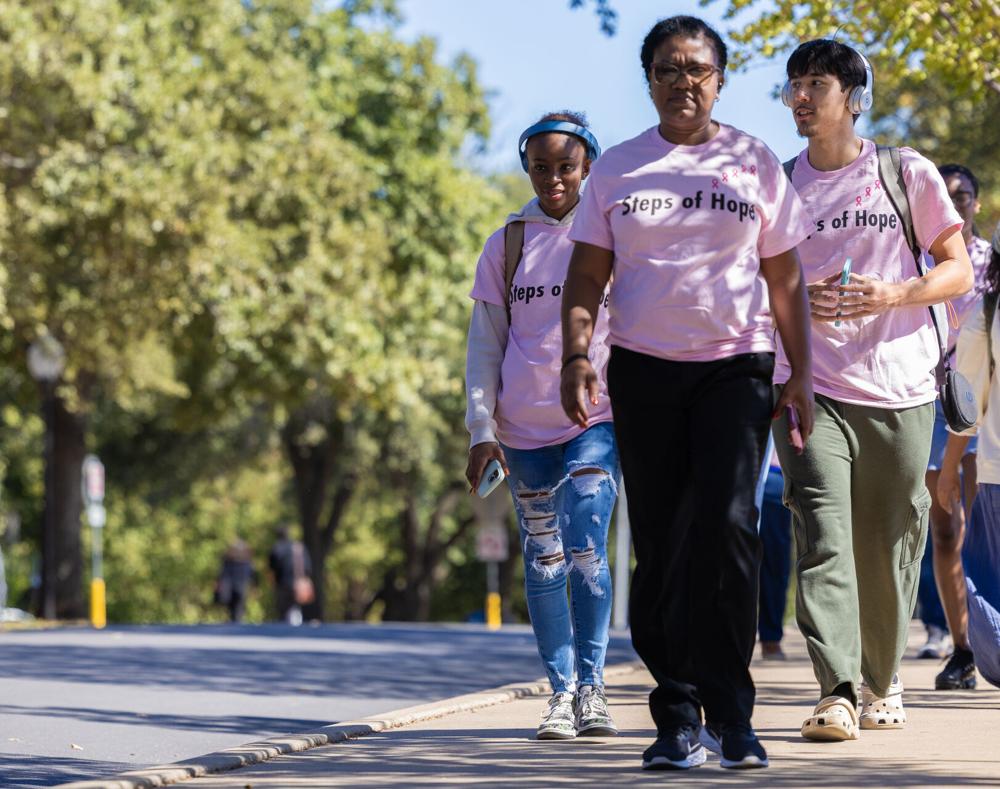
- UTA MavMarket to provide platform for student businessesMavMarket will turn Brazos Park into a UTA student-run bazaar from 10 a.m. to 5 p.m. Thursday. Hosted by the Entrepreneurship Club and powered by the Center for Entrepreneurship and Technology Development, MavMarket is held twice an academic year and provides UTA students with a platform to launch, grow and validate their business ventures, according to the center's website. Chaitanya Sant Kumar, engineering management master's student and Entrepreneurship Club president, said the event will feature a live band and opportunities for audience engagement. Vendors will be selling anything from homemade matcha to trinkets and jewelry. “It doesn’t have to be expensive things, it doesn’t have to be something that is fully complete or polished,” Kumar said. “It just needs to be a product that they can sell.” He said the role of attendees is to provide feedback to the vendors on whether they would buy the products or on changes the vendors might want to make. Kumar said most of the vendors participating in the market are selling self-made products, and everything is student-built. “The overall idea behind MavMarket is to promote student entrepreneurs on campus,” he said. “Everyone has some kind of side hustle that they are doing.” @tay._.sansom news-editor.shorthorn@uta.edu
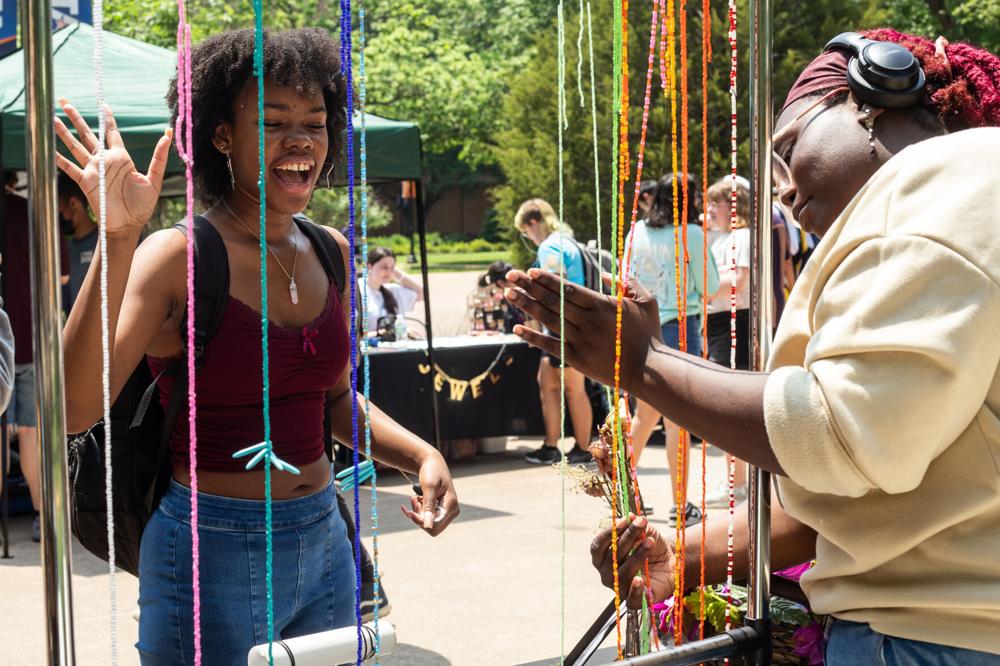
- Student-built cars race to the finish line during UTA's Texas Autocross WeekendAnticipation filled the air Saturday morning as drivers revved their engines and practiced on the course in Lot 49 during the second day of the annual Texas Autocross Weekend competition. Over forty student-built cars sped through the track from schools in Texas, Missouri, Kansas and Louisiana, bringing their best and fastest for this year’s Texas Autocross Weekend, a friendly racing competition between schools. “Texas Autocross Weekend is a chance for teams from all around the country to come and have two days of racing without the nervousness of competition,” said Bob Woods, adviser of the UTA Formula SAE program. UTA President Jennifer Cowley said the university is proud to host the event every year, bringing a mix of students not only from UTA, but from all over the state and the country to compete. “The fact that they’re able to design and build their own race car, they’re getting the full design experience and then getting to see how it works on the road, it’s just fantastic,” Cowley said. “Employers look at that experience and they say, ‘We know we’ve got somebody who’s well-trained and ready to succeed.’” A mix of electric and combustion cars raced, going up to 70 mph, and drawing times from 100 to 70 seconds around the track. “When we go to the national competition, it’s very intense, and this is just racing. So it’s a chance for us to get together, meet each other, look at each other’s cars, and just get to drive,” Woods said. UTA raced a fleet of different cars, dating back to 1995. F26 chassis lead Avani Sattiraju said that UTA keeps almost all its old vehicles. To prepare for the weekend, they spend a month getting all the cars operable and ready for the track. “We’re always constantly doing maintenance, so everyone’s working their ass off to get all these cars running for today,” she said. Formula SAE is an international engineering design competition for undergraduate and graduate students, according to the UTA Racing website. UTA Racing began its Formula SAE team in 1982 and has gone on to win multiple awards domestically and abroad. UTA Racing alumnus John Burford said the competition had a huge impact on his future career. “The thing about Formula SAE is you get out what you put into it,” Burford said. “If you really pour yourself into the program, that work gets recognized, and the things that you learn in the program help you throughout your career.” Burford was on the racing team through the mid to late ’90s. He helped design subsystems as well as the pedals on the 1995 car, and was the team leader and chief engineer on the 1998 car, both of which raced over the weekend. “I thought my learning was going to be done once I was no longer a student, but as I became a part of the SAE organization to run the event, there were all new kinds of things to learn about leadership and how organizations work, and so as long as I’ve ever been involved in it I keep learning new things,” he said. Burford said he continues to bring the cars in and help with their maintenance to give students the opportunity to see how things were done in a different era of racing and mechanics, while also giving them new ideas for designs based off the old ones. Each car that went on the track over the weekend had its nuances or stories that made it unique. The F20R car was built for 2020, but was unable to race due to the competition not happening that year because of the COVID-19 pandemic. This past year, the team rebuilt it and took it to competition, letting it see the action it was built for. “I got to drive it in the events autocross and endurance,” said Kaylee Citarella, data acquisition and electronics lead. “Just being able to work on the car so much it really means a lot to finally see all your hard work and seeing it run.” Others had soft spots for the cars they helped make, maintain or laid eyes on for the first time. “I’m really excited to see ’04 run, that’s my favorite car,” Sattiraju said. “When you become team member, you’re allowed to sit in the cars. So ’04 was the first one I sat in.” The best part of the competition is the sportsmanship, she said. “Last comp, I literally watched this person, he was a driver. He didn’t have socks. This other guy took the socks off his feet from another team and gave it to the other driver,” Sattiraju said. “You’ll never see a community like that ever in your life, because everybody knows just how much time and effort you actually put into these, so everyone wants to see your car run.” It was Houston resident Sarah Mendoza’s, 22, first time at a Texas Autocross Weekend. Her boyfriend, a student at Texas State University, was driving. “It’s super cool seeing all of the cars and I was not expecting as many as there are, but it’s super, super cool seeing them all,” she said. “Just the sheer amount of them is kind of mind-boggling.” Similar to Mendoza, Dallas resident Yesenia Soria, 28, came to the race to support her younger brother, who is on the UTA suspension team. “I think it’s really cool to get to see all of the hard work that students have put in, see the different ways that they have built their vehicles to try to improve performance, and see the camaraderie,” Soria said. @atclements03 news-editor.shorthorn@uta.edu

- UTA goat yoga returns for students living on campusExperience the joys of goats and yoga from 4 to 6 p.m. Thursday at the west lawn behind the Maverick Activities Center. The Residential Outreach Counseling Program, student housing and Campus Recreation will host the fourth goat yoga event at UTA. The activity will have 90 residential student participants spread out between three 30-minute sessions of yoga, with the final 30 minutes dedicated to mingling with the goats. “We have a goat handler who makes sure that each person gets to experience the goats jumping on their back or being around them as they partake in this activity,” said Sineyda Ortiz, assistant director of fitness at Campus Recreation. Registration has closed; however, students have a 15-minute window to show up to the event before their spot will be given away to the next person in line. Attendees are encouraged to bring their own mats or towels, but towels will be provided. “I would say the number one thing is for people to relax and to have a good time,” Ortiz said. @atclements03 news-editor.shorthorn@uta.edu

- Here’s what to know about 17 Texas constitutional amendments being voted on this electionTexans have the opportunity to vote on 17 state constitutional amendments through Nov. 4. Janet Mattern, League of Women Voters of Tarrant County president, said that when an amendment is voted in, the change is permanent unless another amendment is passed in the future to overturn it. She said to keep in mind how things might differ in the future before voting. “Anything that's made permanent, you want to make sure that it's something that will be good for a long time,” Mattern said. Since 1876, Texans have participated in constitutional amendment elections due to Article 17 of the Texas Constitution, which allows voters to decide on proposed amendments. There are 17 proposed constitutional amendments on this year’s ballot, with early voting beginning Oct. 20 and ending Oct. 31. Proposition 1 This aims to create a permanent fund to support educational programs offered by the Texas State Technical College System. Proposition 2 This aims to prohibit the state from imposing a tax on realized or unrealized capital gains of an individual, family, estate or trust. Proposition 3 This would require judges to deny bail under certain circumstances to people accused of certain offenses punishable as a felony. Proposition 4 This would dedicate a portion of revenue from state sales and use taxes to the Texas Water Fund. Proposition 5 This aims to exempt animal feed held by an owner for retail sale from property taxes. Proposition 6 This aims to prohibit the state from imposing a tax on certain security transactions. Proposition 7 This would provide a property tax exemption to surviving spouses of veterans who died due to service-connected causes. Proposition 8 This would prohibit the state from imposing certain death taxes, such as estate and inheritance. Proposition 9 This would extend property tax exemptions to certain business properties. Proposition 10 This would temporarily exempt improvements made to a home destroyed by fire from property taxes. Proposition 11 This aims to increase the homestead exemption from property taxation by school districts for people who are 65 years or older or disabled. Proposition 12 This aims to change how the State Commission on Judicial Conduct functions and handles judicial misconduct. Proposition 13 This aims to increase the homestead property tax exemption from $100,000 to $140,000. Proposition 14 This aims to establish the Dementia Prevention and Research Institute of Texas and the Dementia Prevention and Research Fund with $3 billion from the state general revenue. Proposition 15 This affirms that parents have the primary right to make decisions for their children. Proposition 16 This clarifies that only U.S. citizens can vote. Proposition 17 This aims to exempt properties located in counties that border Mexico from property taxes that arise from construction of border security measures or infrastructure. @hud4qureshi news-editor.shorthorn@uta.edu
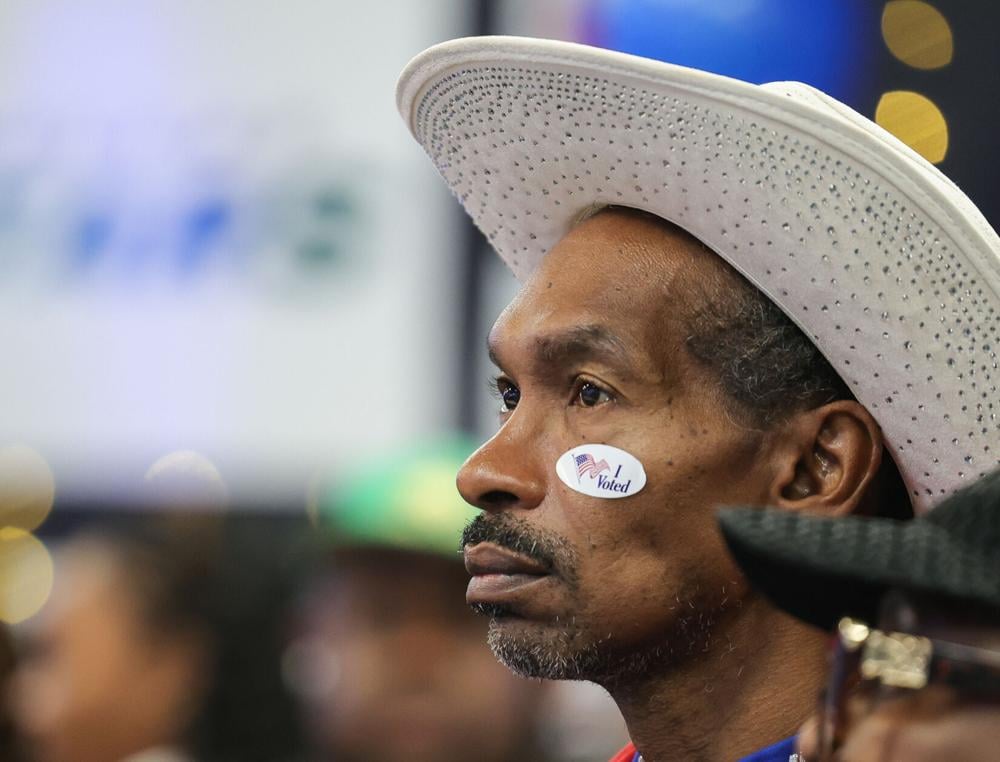
- How Student Government resolutions are enactedAfter clearing the Student Senate on Sept. 2, Resolution 25-12, “Identify A.I.,” might seem like a done deal, but it still has far to go before becoming UTA policy. The resolution asks the university to require all of its promotional materials to include a label if they are made using artificial intelligence, according to previous Shorthorn reporting. Student Body President Effua Jordan said a resolution goes through roughly three or four stages before it’s enforced on campus. Before a resolution leaves the senate, the committee chairs, speaker of the senate and Student Body president add its details to a resolution tracker, which university administrators have access to. This is where they present details and research on the subject, as well as questions that have been asked and responses that have come in. Once a resolution passes the senate, UTA President Jennifer Cowley and Lowell Davis, Student Affairs vice president, meet with the Student Body president and vice president. They use this meeting to interpret the resolution and determine what the senate is asking for. Davis said in an email that after the resolution has made it out of the senate for comment, he does his own research to fully understand it. When needed, he discusses the issue with UTA colleagues and staff members who have expertise in the area and professional colleagues at other institutions, he said. Following that, some resolutions may need a secondary research phase within the External Relations Committee. This is where Resolution 25-12, “Identify A.I.,” currently sits. Aniyah Coston, political science sophomore and External Relations Committee head chair, said that when the committee received the resolution, a lot of initial research had not been conducted, and with the topic revolving around A.I., there was a lot to learn about. As the committee began digging deeper, members discovered growing concerns around AI use on campus, particularly how the technology can reuse or replicate students’ original work without proper credit, said Srisahithi Nemalikanti, Coordinated Admission Program freshman and External Relations Committee member. She said because of this, many artists put an anti-AI sign on their work, and as a result, credibility is being lost for people who want to use AI. During the committee’s early research, members uncovered new insights in AI usage and citation practices on campus. Nemalikanti said during the secondary research phase of the resolution, the committee discovered that AI is supposed to be cited in all cases, but it’s not known on campus because individuals follow curriculum-based rules. An example of this would be in the English department. Nemalikanti said the department currently states AI must be cited for writing, but doesn’t specify for AI-generated images or any other use. “Because it’s not explicitly stated, it’s not explicitly followed, and that is a problem that is prominent on campus,” she said. As part of their research, committee members also focus on identifying stronger implementation strategies to create a solid foundation for the resolution. “Without a foundation, that resolution has no means or necessarily any possible reason for even being there,” Nemalikanti said. Research entails not just reading articles but talking to individuals who have experience. The committee contacted the engineering department to gain insight into their ideals of AI usage. “The reason we talked to the engineering department is because they have prominent use of AI inside of their building,” Nemalikanti said. She said the purpose of this process is to get more support and eyes on each case. “The more people that have eyes on this, the more support we have or the more information we have as to what people genuinely think about this topic, because this is for everyone on campus, not just Student Government,” she said. Once the committee and the administration have collected enough information, Davis and Cowley determine what best serves students and the university in terms of implementation, then meet with Student Government leaders to provide feedback. During the meeting, possible implementation, potential benefits and unintended consequences that might result from the resolution are discussed, and that information is then given to the full Student Government so they can make an informed decision Jordan said if everyone is on board with the resolution and they can ensure full administrative backing, the resolution would be implemented, maybe by the next academic year. “I highly value this process because it’s very collegial in nature,” Davis said in an email. “It allows me, as the Vice President for Student Affairs, to work directly with students and UTA leaders to enhance campus life in meaningful ways and to work on policies and procedures that impact the student experience.” @tay._.sansom @taylormakynzee news-editor.shorthorn@uta.edu

- Plan, prepare, participate: Voting tips for first-time votersNursing sophomore Janaria Justice will vote for the first time in the Nov. 4 Texas constitutional amendment election. A lot of questions were running through her mind when she was registering to vote, like what to expect when voting, what are the benefits and opportunities, and what are the rules when voting, Justice said. Nonetheless, she said she was excited to participate. Justice is one of millions of young adults stepping into civic participation for the first time, a group that often faces confusion. According to the Pew Research Center, 15% of nonvoting U.S. citizens said voting was inconvenient. Whether individuals are voting for the first time, like Justice, or have been engaged in civic duty for years, here are some tips to make the most of this election season. Plan ahead Janet Mattern, League of Women Voters of Tarrant County president, said she always tells voters to arrive at the polls early, plan transportation and locate the closest polling places. Mattern said there are three ways to vote: by mail, during early voting or on Election Day. When voting on Election Day, she said, voters should arrive at the polls well before 7 p.m. Early voting began Monday and ends Oct. 31. Election Day is Nov. 4. Know what’s on the ballot Another tip Mattern shared was to know what’s on the ballot ahead of time. Mattern said the league provides resources for voters to look up that information. “When you go out and you get that information, then you know for sure that you have the confidence that you’re voting for the candidate that’s going to be best for you and best for your community,” she said. Mattern said voters are allowed to take a paper with their election choices into the voting booth with them if needed to review any research. “It’s best if the voter, or the student in this case, gets all the knowledge ahead of time, because knowledge is power,” she said. Accommodations Voters with disabilities can receive accommodations. Mattern said that all polling locations are required to comply with the Americans with Disabilities Act. Individuals who have difficulty walking can use curbside voting or go to the front of the line. If a mistake is made on the ballot, voters can alert the election clerk to redo their ballot. She also said voters should make sure they don’t leave with their ballot, as their vote will not be counted if they do. Different ways to vote The last day to complete a mail-in ballot application is Oct. 24. Mattern said the application needs to be completed every year. Voters who recently registered to vote and are told they aren't on the voting list, she said, can fill out a provisional ballot. “There’s always ways that we can make voting easier and not harder,” Mattern said. “That’s one of the things that’s our goal." @tay._.sansom news-editor.shorthorn@uta.edu

- UTA Campus Cat Coalition helps cats through trap-neuter-release programThe Campus Cat Coalition is a large UTA student group that works to protect and care for over 150 cats on campus each year. One of the many ways the group helps campus cats is through its trap-neuter-return program, and last Tuesday, they caught Atzi. Atzi, a mother with kittens, is the third cat to go through the process this semester. Unspayed female cats with kittens are the top priority for the program, said Derek Fuentes, Campus Cat Coalition trap-neuter-return officer. Alysa Potter, a social media manager for the coalition, takes part in socializing the cats that frequent the First Baptist Arlington parking lot across the street from the UTA Bookstore, where Atzi was residing with her kittens. Potter said the coalition noticed Atzi, who is about a year old now, in January but didn’t get a good glimpse of her until April. She hissed and bolted at the sight of Potter in the beginning. “She was very scared,” Potter said. “She was very, very feral. She was born outside, so she was not a big fan of people.” Around the start of the fall semester, Atzi had kittens. As a result, she started warming up to Potter due to being a hungry, nursing mother. “She'll come up and I've pet her a couple times, which is really amazing. Especially when you first met her, you would have never believed that cat could’ve been calm,” Potter said. However, Atzi’s status as an unspayed female cat put her at risk. According to Robert Knox, director of programs at the Texas Coalition for Animal Protection, if an unspayed female cat is left to her own devices, she could potentially have over 100 offspring in her lifetime. Being pregnant and nursing can be very stressful for female cats struggling to survive. More than half of feral kittens can die due to malnutrition, according to the Texas Coalition for Animal Protection website. This put Atzi on Fuentes’s radar. Last Tuesday, about 10 members of the coalition came together to try to trap Atzi and any other cats on their list. The night started slowly, consisting of waiting around for the cats to fall for the trap. Fuentes said trapping the cats can feel like a Tom and Jerry-style game. “It's like a cardboard box with a stick and cheese,” he said. “We have one of those, pretty much. But it is made out of metal.” Eventually, Atzi wandered over to eat the food in the trap. When she was safely inside, Fuentes pulled on a long string of yarn, which brought down the trap on Atzi. She was immediately keen on escaping, and the coalition members placed a large blanket over the trap to calm her down. They transferred her to a smaller cage with 4 people holding down the trap to make sure the transfer went smoothly as she made it to the trunk of Fuentes’ car, since he would be fostering her. Early the next morning, he took Atzi to the Texas Coalition for Animal Protection clinic in Arlington to be spayed. The clinic performs spaying and neutering procedures for free each day for the first 12 feral cats that are brought in. Knox said there’s a massive population that wouldn’t be served if they didn’t make these surgeries free. He said feral cats can be like ghosts in the animal world, and it can go unnoticed just how many there are. “There's just people who just love taking care of animals, and they don't want to see them reproducing, because that creates a lot of strain for the cats,” Knox said. “So we try and limit overpopulation by making this option available, because spay and neuter is the most humane way of curbing animal overpopulation.” By 4 p.m., Atzi was back with Fuentes to recover for 48 hours before she could be released. Fuentes said it can be hard for cats who are not used to being inside to adjust. “For them, it is like, ‘Oh, I'm in a big, scary, enclosed space and all these big creatures are doing things to me, and I don't know where I am,’ stuff like that,” he said. “So the best we can do is to just provide them a space where they can feel as comfortable as possible.” Fuentes said finding fosters can be an issue, and Potter said the coalition is working with around two foster homes currently. “We provide everything,” Fuentes said. “So generally, all we're looking for is someone to offer up that space and time.” On Friday evening, Atzi was released back into the parking lot where she’d been trapped. She hesitated when the cage door opened, but when she realized she was free to leave, she ran directly for the sewers, disappearing for the time being. Fuentes said it’s common for cats, including other campus cats, to be in sewers because they provide shelter and warmth. “Atzi is not the only cat to do it,” he said. “Her kittens that we saw on Tuesday night were doing it. Microwave does it. Personally, the first interaction I've ever had with Twix, she came out of the sewers to greet me.” Potter said it might take time for Atzi to trust them again because they were there when she was trapped, but eventually she’ll get used to Potter again. “Safety for the cat comes first,” Potter said. “Even if they don't realize it.” @hud4qureshi news-editor.shorthorn@uta.edu
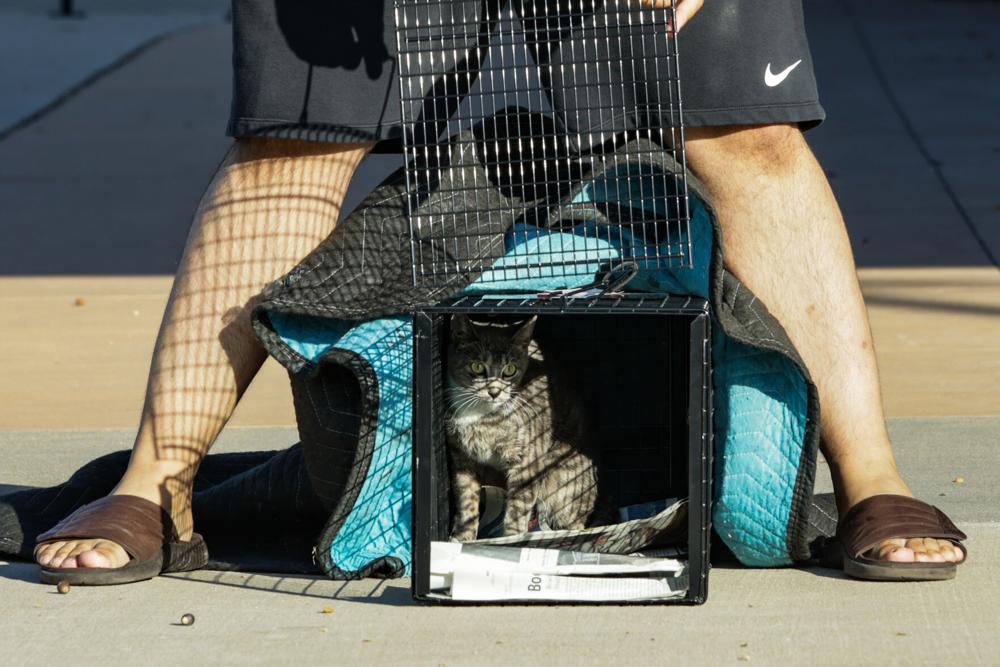
- How enrollment is shaping UTA collegesUTA reported 42,710 undergraduate and graduate students this fall, a 2.6% increase from last year bolstered by a record freshman class. Despite the overall growth, the university’s individual colleges have vastly different student enrollment. The Shorthorn compiled enrollment data from each college and recorded which saw growth, which experienced a decrease and how changes in enrollment are shaping the colleges’ futures. College of Nursing and Health Innovation The College of Nursing and Health Innovation saw the most significant growth in fall enrollment — an 11.57% leap from 2024 — and continues to house the largest student population at UTA with 13,302 people in the college, according to Texas Higher Education Coordinating Board data. Undergraduate nursing students make up the majority of that population, with graduate nursing students not far behind, said Jeffrey Taylor, executive director of the college’s Office of Enrollment and Student Services. Other programs like kinesiology and public health only account for a fraction of enrollment, Taylor said. Like most of UTA’s colleges, the College of Nursing and Health Innovation experienced a dip in enrollment after 2020, following the COVID-19 pandemic, but has been steadily climbing back since. In 2020, the college had 20,680 students enrolled, according to College of Nursing and Health Innovation internal data. Post-COVID-19 challenges haven’t been exclusive to higher education. Taylor said nursing as a whole may have been suffering from burnout issues during that time, and people were just working on “surviving,” not advancing their education. However, new university students have been turning back to the program, which, accompanied by a growing need for nurses, is great for UTA, he said. While the college continues to grow back toward its peak enrollment, the physical limitations of having many students become more prevalent. “One of the limitations is literally clinical sites, because we can’t bring them in and teach them how to be a nurse if we don’t have a hospital for them to go to to actually practice,” Taylor said. With the opening of UTA West set for 2028, the college is looking for new clinical locations westward to continue expanding. “We’ve got very robust on the undergrad side,” Taylor said. “I think the graduate side is probably where a lot of focus will be coming.” College of Science The College of Science has had a 10.6% increase in student enrollment since fall 2024, going from 3,940 students to 4,359 students, according to Texas Higher Education Coordinating Board data. Valerie Martinez, director of student success and recruitment in the College of Science, said that it was the second-highest enrollment increase this fall, after the College of Nursing and Health Innovation. Martinez said the increases in enrollment are due to many factors, like changes in overall strategic planning of enrollment management across the university, a new academic recruiter that allowed the college to branch out into different markets, one-stop solution hubs, orientation programming and new science ambassadors. “I don’t think it was just one thing that we did necessarily in the College of Science,” Martinez said. “I think it was just really a lot of little changes and things that multiple offices throughout the university did to contribute to the enrollment increase.” The Division of Data Science within the college, one of the newer programs, has also boosted enrollment. Martinez said the 18-month program is one of the fastest-growing programs in the college. “We’re the College of Science, and so I feel like innovation really kind of lies here,” Martinez said. “I always tell students that here in the College of Science, we have so many different resources.” The college changed its Maverick Experience programming and involvement with academic departments within the recruitment process to give prospective students an idea of what it would be like in a specific major, Martinez said. The College of Science also has the Life Science Building, which is currently being renovated. When it is finished in 2027, it will allow for more students in programs like biology. “We were really strategic this year in monitoring class enrollment seat projections and really making sure that we had spaces for our students, and so that’s always kind of like the catch, you’ve got to make sure we have space for the students who we’re enrolling,” she said. College of Business Fernando Jaramillo, associate dean for academic affairs in the College of Business, said the college has had a 3.89% increase in enrollment this fall, with much of the growth coming from its undergraduate programs. From new degrees like hospitality management and entrepreneurship to traditional degrees like accounting and management, degrees are created and maintained in accordance with the needs of students, Jaramillo said. With a rising preference among students for online courses, the college has created more online courses, with its MBA program available completely online. The college is in the process of making its management and marketing programs 100% online as well, he said. “Many of our students come from work, and many of them work on a full-time basis, so they cannot afford to drive to campus every day to take a class,” Jaramillo said. “So we have increased our portfolio of online delivery.” College of Liberal Arts The College of Liberal Arts had a 6.64% increase from fall 2024, according to Texas Higher Education Coordinating Board data. The philosophy department had a 43% increase this fall. Linguistics and TESOL, Teachers of English to Speakers of Other Languages, had a 33% increase. The more typically popular departments, like history and geography, are continuing to hold “steady,” said Desirée Henderson, associate dean for education in the College of Liberal Arts. Henderson said the increase is due to recruitment efforts. She said potential students are looking at liberal arts education and what it provides, which is the skills needed for their future careers. “We’re really extremely happy to have that increase and really excited to see so many students on campus,” Henderson said. The college used data tools to predict the number of students and what courses were needed. New sections were opened, specifically core courses, to accommodate the larger number of students. “There’s a lot of moving parts, but it’s all really good news for the university and for the college as a whole,” Henderson said. School of Social Work The School of Social Work had a 5.01% increase in enrollment from fall 2024 to 2025, now having 2,244 students, according to Texas Higher Education Coordinating Board data. In 2024, the college had 2,137 students. Graduate students currently account for the majority of the college’s enrollment and have remained the largest group for at least five years. The college has grown steadily since 2021, only experiencing a slight enrollment dip in fall 2023, then rising again. Despite uncertainty surrounding collegiate funding from the federal government, Tonya Hansel, School of Social Work associate dean for research, said the political landscape is nothing new, and the profession of social work is positioned to lower costs while keeping social services available. “We are leading innovation in how we can do more with less while continuing to advocate for the dignity and worth of every person,” Hansel said in an email. College of Engineering Despite remaining the second-largest body of students on campus, the College of Engineering experienced a 5.25% dip in enrollment, according to Texas Higher Education Coordinating Board data. The college currently reports 9,127 students, compared to 9,633 in fall 2024. College of Architecture, Planning and Public Affairs The College of Architecture, Planning and Public Affairs experienced a 3.65% decrease in enrollment in fall 2025, now having 1,268 students compared to 1,316 in 2024, according to Texas Higher Education Coordinating Board data. College of Education The College of Education saw a 14.32% decrease in enrollment, with 162 fewer students than in fall 2024. The Division of Student Success The Division of Student Success experienced a 41.21% decrease in enrollment, going from 1,422 students in fall 2024 to 836 in 2025, according to Texas Higher Education Coordinating Board Data. @atclements03 @PMalkomes news-editor.shorthorn@uta.edu
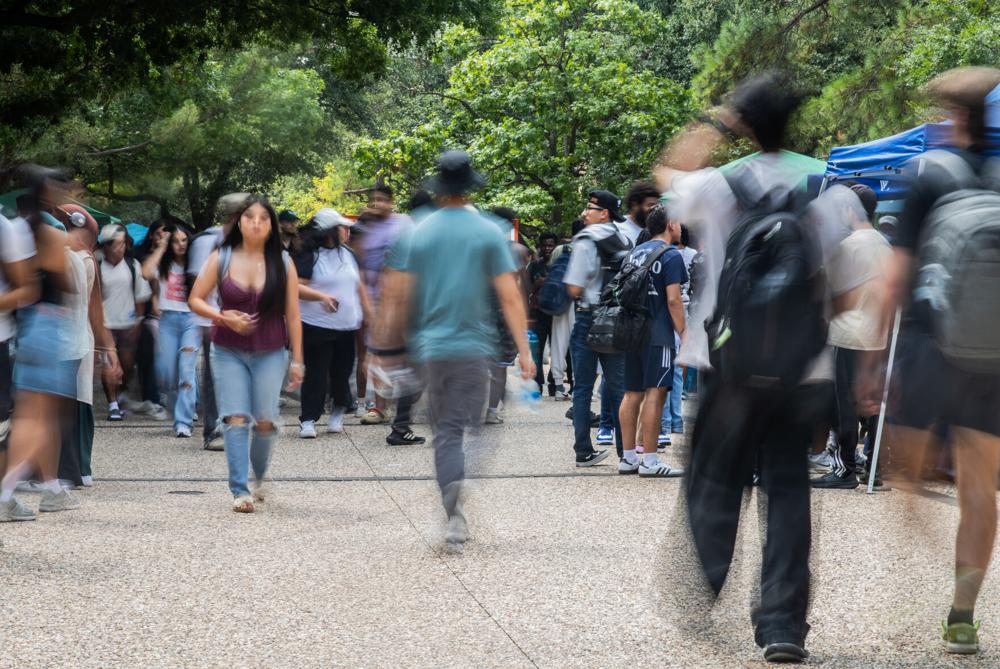
- Fluctuating temperatures expected in Dallas-Fort Worth this weekDallas-Fort Worth residents can expect fluctuating temperatures this week, with highs approaching the 90s and lows around the mid-50s. Monique Sellers, National Weather Service meteorologist, said the week is going to be mostly quiet, but temperatures will fluctuate, like a roller coaster, in the early part of the week. “We’re in the fall, so it’s a transition season for us, so you do kind of see a little bit of everything,” she said. @tay._.sansom news-editor.shorthorn@uta.edu

- UTA Herpetology Club presents Night at the Museum community tourEver wondered what happens at the herpetology museum on the west side of campus? Filled with rows of jarred amphibians and reptiles floating in preservation fluid, the museum houses the largest preserved collection of reptiles and amphibians in Texas, and is in the top 10 in the world, said Gregory Pandelis, collections manager and biological curator. Pandelis said the museum is usually only open to scientists, but in the name of connecting with more students and the community, once a semester they open the museum to the community through the Maverick Herpetology Club. Students and residents will have the chance to see the museum at the Night at the Museum tour, which will take place at 6 p.m. Tuesday at the Amphibian and Reptile Diversity Research Center. “I love doing tours like this,” Pandelis said. “It’s always very exciting for me, and I love showing people around and telling them about what we do.” He said he will show attendees all of the different parts of the museum and the specimens, and talk about the research done at the museum, why the specimens are important and why they are a valuable resource at UTA. Reptiles and amphibians are a really important part of natural ecosystems, Pandelis said. They are both predators and prey, and studying them helps to understand the world around us. “I think it’s very important to bring what we do to the public in a way that’s understandable to the average person,” Pandelis said. @atclements03 news-editor.shorthorn@uta.edu
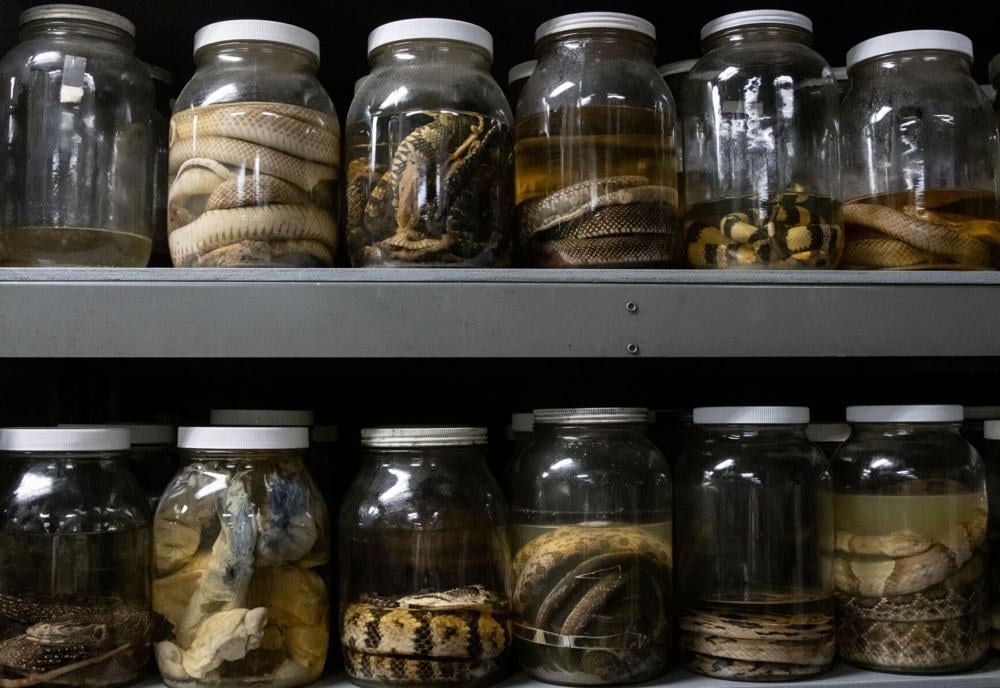
- Arlington Mayor Jim Ross discusses events, economy, budget in State of the City AddressThe Greater Arlington Chamber of Commerce hosted the 20th annual State of the City Address on Thursday at Esports Stadium Arlington. Mayor Jim Ross served as the keynote speaker and went over topics such as budget updates, business and economic growth and updates on big events the city will host — all to show how Arlington works. Event updates The city has multiple events coming up, including nine FIFA World Cup matches, the Grand Prix of Arlington, Lone Star Smokeout and the second annual Arlington Veterans Day Parade. Arlington will host its Veterans Day Parade this year on Nov. 11 with a sunset parade, Ross said. Former Secretary of State Rex Tillerson will be the grand marshal of the event. In less than nine months, Arlington will host nine FIFA World Cup games, more than any other city, including a semifinal game. “Over 100,000 people per game coming to Arlington with an economic impact upwards of $2 billion for North Texas,” he said. The INDYCAR Grand Prix of Arlington will hit the streets of the Entertainment District March 13-15. Arlington will be bringing back the Lone Star Smokeout event, a multiday festival celebrating country music and barbecue. “We will make this a marquee event year after year,” Ross said. “Watch this thing grow.” Business and economic growth Since 2021, when Ross became mayor of Arlington, the city has had $1.1 billion of private capital investment and either attracted or retained 13 headquarters. Ross said that since 2021 the city has also created more than 27,000 jobs. There has also been a 20% increase in the average wage since that time. “This growth is with purpose,” he said. “It’s not by accident that we’re growing the way we are growing.” Over the past year, visitors to the city spent $3.1 billion, and Arlington is now ranked #29 in top meeting destinations in the country, Ross said. After opening the convention center, the number climbed up, even eclipsing Fort Worth. Companies like Salcomp, an electronic accessory manufacturing company, have moved in to Arlington. E-Space recently broke ground on its new facility, and StatLab has brought manufacturing jobs that build cancer treatment machines. Ross said these companies coming to Arlington are significant wins for the city. Budget updates The city faced a $26 million budget shortfall, due to six reasons, Ross said. He said the city anticipated two of the reasons, the first being the end of American Rescue Plan Act money, which was federal government funding for the pandemic, and the second being senior tax rate freezes. Ross said the city had no way of anticipating the other reasons. Conservative valuations from the Tarrant County appraisal district, property tax protests, traveling housing finance corporations and business personal property tax exemptions all played a part in the deficit. Ways the city has been able to close the gap included financial restructuring and adjusting fees, eliminating vacant positions and increasing the property tax rate, which takes the rate to what it was in 2019, Ross said. “Still 2 cents below the highest point in Arlington and still doing very well compared to other cities in North Texas,” he said. “That’s what had to be done to close that gap.” @wall035203 news-editor.shorthorn@uta.edu

- Here are some UTA and Arlington Halloween-themed eventsUTA and Arlington are hosting various spooky events that students and residents can attend. The Shorthorn compiled a list of six events. Giving Ghoul Drive The Relationship Violence and Sexual Assault Program’s Connect group, CommUnity Hands, invites students to give back this season at its Giving Ghoul Drive. Students can drop off donations from 8 a.m. to 4 p.m. Oct. 23-24 at Ransom Hall Room 301 and earn one volunteer hour for every two items donated. Participants will also have the opportunity to enter a raffle to win a Boo Basket. When dropping off items, students should inform the front desk at Ransom Hall that the donations are for the Giving Ghoul Drive. Nights of Frights Explore the Haunted Mirror Maze, Wax Museum of Fear and the 7D Werewolf Ride from 7 to 11 p.m. Oct. 18 and 25 at Ripley's Believe It or Not! and Louis Tussaud's Wax Works. Tickets cost $29.99. Trunk or Treat Join the MavTHAT ASL Club from 5 to 7 p.m. Oct. 27 at the upstairs Maverick Activities Center lounge for Trunk or Treat. This event aims to raise awareness of Deaf culture and American Sign Language. Games, food and prizes will be available. Fraternity and Sorority Life Great Pumpkin Carnival UTA’s fraternity and sorority community welcomes faculty, staff, students and the Arlington community to celebrate the Great Pumpkin Carnival from 5:30 to 7:30 p.m. on Oct. 29 at the Fraternity and Sorority Life Community Center. The carnival will feature games, activities, snacks, candy and more. Local vendors offering handcrafted items will be in attendance as well. Nightmare on UTA Blvd. Members of the UTA community are invited to a haunted house from noon to 4 p.m. Oct. 31 at the Swift Center. Students can have a spooky good time with candy, crafts and more. This event is hosted by the Office of International Education, the Center for African American Studies, the Center for Mexican American Studies and the Department of Global Engagement. The World of Pumpkin Nights Travel a half-mile trail dotted with the Forbidden City, a Pirate’s Cove and other lands illuminated by more than 7,500 pumpkins at The World of Pumpkins Nights from 7 to 9 p.m. through Nov. 2 at Howell Farms. Ticket prices vary and must be bought online. @court.franklin news-editor.shorthorn@uta.edu

- Terroristic threat, assault and possession of drug paraphernalia reported in this week’s crime logThis is a crime wrap-up from Oct. 8 to 11. Criminal trespass — possession of marijuana On Oct. 8, officers arrested an unaffiliated individual for violating a criminal trespass warning, UTA Police Capt. Mike McCord said in an email. The individual was transported to the Arlington Police Department jail. If the offender has not been previously convicted of trespassing on higher education property, the offense is a class B misdemeanor punishable by a fine not to exceed $2,000, confinement in jail of up to 180 days or both. If the offender has been previously convicted, the offense is a class A misdemeanor punishable by a fine not exceeding $4,000, up to one year in jail or both. Possession of marijuana of two ounces or less is a class B misdemeanor punishable by a fine not to exceed $2,000, up to 180 days in jail or both. Assault On Oct. 8, a student reported being assaulted by his girlfriend, McCord said. Assault causing injury to a family member is a third-degree felony punishable by jail time between two and 10 years or a fine not exceeding $10,000. The case is still active. Terroristic threat On Oct. 10, a student reported receiving harassing text messages, McCord said. A terroristic threat causing fear of imminent serious bodily injury is a class B misdemeanor punishable by a fine not to exceed $2,000, confinement in jail for up to 180 days or both. The case is still active. Possession of drug paraphernalia On Oct. 11, an unaffiliated individual, who was arrested for multiple warrants, was stopped for a traffic violation and was found to be in possession of a THC infused vape, McCord said. The individual was transported to the Arlington Police Department jail. Possession of drug paraphernalia of two ounces or less is a class B misdemeanor punishable by a fine not exceeding $2,000, up to 180 days in jail or both. Reckless damage or destruction of property On Oct. 11, an officer investigated damage to a gate bollard, McCord said. Reckless damage or destruction of property is a class C misdemeanor punishable by a fine not to exceed $500. The case is still active. @PMalkomes news-editor.shorthorn@uta.edu

- UTA to hold Friends and Family Weekend Friday and SaturdayUTA Parent and Family Services will host Friends and Family Weekend from 4 to 7 p.m. Friday and from 10 a.m. to 2 p.m. Saturday. Students and their families can enjoy a variety of events, from volleyball to a planetarium show. Tickets are free for UTA students, and on-site registration is still available with all-access tickets costing $75 for adults and $30 for ages 6-17. Lauren Puls, assistant director of Parent and Family Services, said Friends and Family weekend has been a long-standing tradition at UTA since 2006. [cq website “The main purpose of it is to give families an opportunity to reconnect with their student,’’ Puls said. The biggest thing that families can gain from the event is quality time, Puls said. The event provides a schedule of different activities to do, but families can also go off campus to explore and see things through their students’ point of view. “It’s a great time of year to reconnect with their student because it’s typically right after midterm exams,’’ she said. The All-Access Pass includes a T-shirt, access to activities Friday and Saturday, light refreshments Friday, breakfast and dinner Saturday, a ticket to the UTA women’s volleyball game and admission to the planetarium. @ayesha.haroonn news-editor.shorthorn@uta.edu

- UTA Volunteers to host fair connecting students with volunteer opportunitiesUTA Volunteers will host a fall volunteer fair from 1 to 4 p.m. Tuesday in the Palo Duro Lounge in the University Center to connect students with local organizations and inspire community involvement across Arlington. The event will feature about 20 organizations, with more expected to join. Calliope Bradford, UTA Volunteers student director of marketing, said students can stop by the tables to learn about volunteer opportunities and can sign up with an organization they wish to support, such as animal shelters, food banks and educational programs. “Volunteer fair is an opportunity for students to have a localized reach on the volunteer opportunities happening in the greater Arlington area,” Bradford said. The fair also includes an interactive element where students can assemble snack and hygiene bags that will be donated to a church’s trunk or treat event for children, she said. There will also be games, snacks, prizes and new merchandise from UTA Volunteers available. “We're built to work as a community,” Bradford said. “Anytime that you can give back, it makes the world a better place. Even little things — stopping and complimenting somebody's shoes, stopping and making sure that someone's okay and has all of their stuff — all of it is service.” Destiny Aladeyelu, UTA Volunteers graduate adviser, said the fair provides students an opportunity to use their time and energy to support local nonprofits that provide resources to the community. Aladeyelu said the main purpose of the fair is to build connections between students and community service opportunities. “Leadership, in my eyes, is all about making a positive difference,” she said. @samip.parajuli.54 news-editor.shorthorn@uta.edu

- Students to examine street design around UTA in Urban Planning SimulationThe Texas Public Health Association Mavericks will host an Urban Planning Simulation from noon to 3 p.m. Friday in the Nueces Room in The Commons. Led by Cameron Walker, chair of the TPHA Urban Planning Section and member of the Texas chapter of the American Planning Association, students will observe Mitchell Street and UTA Boulevard and think of ways to make them “complete streets.” A complete street is “an approach to planning, designing and building streets that enables safe access for all users, including pedestrians, bicyclists, motorists and transit riders of all ages and abilities,” said Destiny Aladeyelu, president of the Texas Public Health Association Mavericks student chapter, in a Teams message. Earlier this year, Aladeyelu attended the Texas Public Health Association’s annual education conference in Brownsville, Texas. While there, she participated in an urban planning event. Aladeyelu said she found it helpful as a public health professional and said that it helps people be mindful of the things that impact others. “They have complete autonomy to build the street however they want to, but they have to keep in mind, obviously, the population that they aim to serve,” she said. Students will be given a budget, a map and a list of supplies they could use to design the street, Aladeyelu said. Walker will also give a brief overview of what complete streets are and guide students through the process of creating one. “I hope students will show up to expand their knowledge and expertise,” Aladeyelu said. “Transportation is a huge deal. We all need to get around from point A to point B, and especially walkability in Arlington is a concern.” @atclements03 news-editor.shorthorn@uta.edu

Load more...
Loading...


